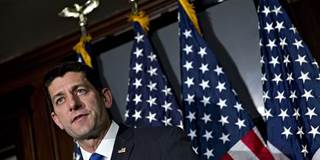Despite US President Barack Obama's string of major foreign-policy successes over the last 12 months – from the Iran nuclear agreement to restoring relations with Cuba – America's global leadership role remains uncertain. What is clear is that US politics, not external developments, will be the main determinant.
CAMBRIDGE – US President Barack Obama has racked up a series of foreign-policy triumphs over the last 12 months. But one that has gained less attention than others was the passage last December of legislation to reform the International Monetary Fund, after five years of obstruction by the US Congress. As the IMF convenes in Washington, DC, for its annual spring meetings on April 15-17, we should pause to savor the importance of this achievement. After all, if the United States had let yet another year go by without ratifying the IMF quota reform, it would have essentially handed over the keys of global economic leadership to China.
The IMF reform was crucial: The allocation of monetary contributions and voting power among member countries had to be updated to reflect the shifts in global economic power in recent decades. Specifically, emerging-market economies like Brazil, China, and India gained a larger role, primarily at the expense of European and Persian Gulf countries.
Obama managed to persuade the leaders of the other G-20 countries to agree to the reform at a 2010 summit in Seoul. The deal’s subsequent approval should have been a no-brainer for Congress, as it neither increased America’s financial obligations nor took away its voting dominance. More important, the reform represented a golden opportunity for the US to demonstrate global leadership, by recognizing that the existing international order must accommodate changing economic-power dynamics.

CAMBRIDGE – US President Barack Obama has racked up a series of foreign-policy triumphs over the last 12 months. But one that has gained less attention than others was the passage last December of legislation to reform the International Monetary Fund, after five years of obstruction by the US Congress. As the IMF convenes in Washington, DC, for its annual spring meetings on April 15-17, we should pause to savor the importance of this achievement. After all, if the United States had let yet another year go by without ratifying the IMF quota reform, it would have essentially handed over the keys of global economic leadership to China.
The IMF reform was crucial: The allocation of monetary contributions and voting power among member countries had to be updated to reflect the shifts in global economic power in recent decades. Specifically, emerging-market economies like Brazil, China, and India gained a larger role, primarily at the expense of European and Persian Gulf countries.
Obama managed to persuade the leaders of the other G-20 countries to agree to the reform at a 2010 summit in Seoul. The deal’s subsequent approval should have been a no-brainer for Congress, as it neither increased America’s financial obligations nor took away its voting dominance. More important, the reform represented a golden opportunity for the US to demonstrate global leadership, by recognizing that the existing international order must accommodate changing economic-power dynamics.